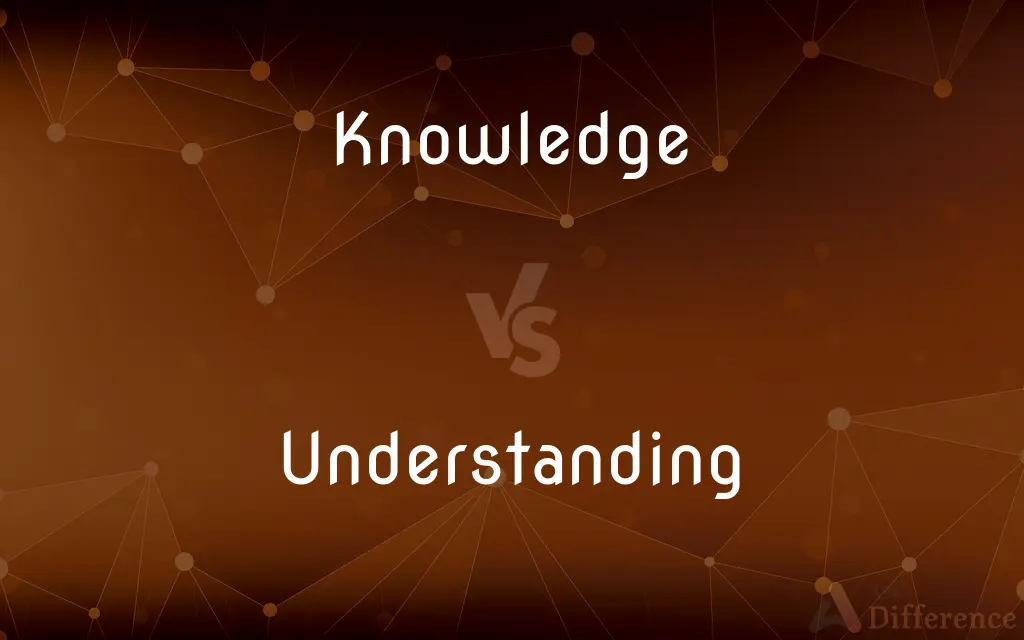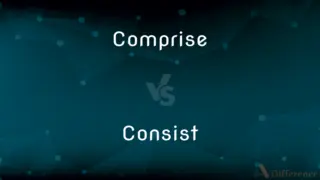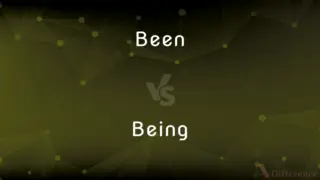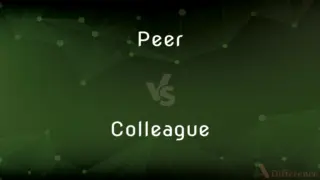Knowledge vs. Understanding — What's the Difference?
By Tayyaba Rehman — Updated on September 18, 2023
"Knowledge" refers to the accumulation of facts, information, or skills acquired through experience or education. "Understanding" goes beyond mere knowledge to include the ability to interpret, infer, and apply the information meaningfully.

Difference Between Knowledge and Understanding
Table of Contents
ADVERTISEMENT
Key Differences
"Knowledge" is essentially the collection of facts, data, or skills that one acquires through education, experience, or training. It is quantifiable and can often be measured through tests or evaluations. "Understanding," on the other hand, involves a deeper level of processing, interpreting the facts and data meaningfully to derive conclusions or make predictions.
While "knowledge" often serves as the foundation for many intellectual endeavors, "understanding" takes it a step further by adding context, interpretation, and the ability to apply what one knows in various situations. Knowledge might tell you that water boils at 100°C, but understanding explains why this happens and under what conditions it might differ.
Both "knowledge" and "understanding" are nouns, but the applications of these words can vary. "Knowledge" is often used in academic and professional contexts to indicate expertise or familiarity with a particular subject. "Understanding" is more broadly applicable, as it can refer to interpersonal skills, emotional intelligence, and the ability to adapt and apply skills or information.
"Knowledge" is often the precursor to "understanding," but they are not mutually exclusive. One can have knowledge without understanding, such as knowing historical dates without understanding their significance. Conversely, one can have understanding without complete knowledge; for instance, you might understand the concept of love without knowing all its psychological or biological underpinnings.
Comparison Chart
Basic Definition
Collection of facts, data, or skills
Interpretation and application of knowledge
ADVERTISEMENT
Contextual Use
Academic, professional
Broad, including interpersonal relationships
Emotional Component
Generally lacks emotional context
Often includes emotional or contextual grasp
Part of Speech
Noun
Noun
Depth
Surface-level
Deeper level of comprehension
Compare with Definitions
Knowledge
The acquisition of factual information.
Her knowledge in science is exceptional.
Understanding
Emotional intelligence or empathy.
Her understanding nature made her a great counselor.
Knowledge
A collection of skills gained through experience.
His knowledge of carpentry came in handy.
Understanding
A contextual grasp of situations or concepts.
His understanding of cultural differences is profound.
Knowledge
Expertise in a given area.
Her knowledge in programming landed her the job.
Understanding
Informed awareness or intuition.
She had an understanding of what needed to be done.
Knowledge
Familiarity with a specific subject or field.
Her knowledge of French literature is vast.
Understanding
The application of knowledge or skills.
His understanding of the game's mechanics led to victory.
Knowledge
Knowledge is a familiarity, awareness, or understanding of someone or something, such as facts (descriptive knowledge), skills (procedural knowledge), or objects (acquaintance knowledge). By most accounts, knowledge can be acquired in many different ways and from many sources, including but not limited to perception, reason, memory, testimony, scientific inquiry, education, and practice.
Understanding
The ability to interpret information meaningfully.
His understanding of complex equations is remarkable.
Knowledge
Facts, information, and skills acquired through experience or education; the theoretical or practical understanding of a subject
A thirst for knowledge
Her considerable knowledge of antiques
Understanding
Understanding is a psychological process related to an abstract or physical object, such as a person, situation, or message whereby one is able to use concepts to model that object. Understanding is a relation between the knower and an object of understanding.
Knowledge
Awareness or familiarity gained by experience of a fact or situation
The programme had been developed without his knowledge
He denied all knowledge of the incidents
Understanding
The ability by which one understands; intelligence
Concepts that are beyond the understanding of a child.
Knowledge
Sexual intercourse.
Understanding
The quality or condition of one who understands; comprehension
Do you have much understanding of calculus?.
Knowledge
The state or fact of knowing
Humans naturally aspire to knowledge.
Understanding
Individual or specified judgment or outlook; opinion
In my understanding, this is a good plan.
Knowledge
Familiarity, awareness, or understanding gained through experience or study
Has great knowledge of these parts.
Has only limited knowledge of chemistry.
Understanding
A usually implicit agreement between two or more people or groups
An understanding between neighbors over late-night noise.
Knowledge
The sum or range of what has been perceived, discovered, or learned
The extraordinary knowledge housed in the library.
Understanding
A disposition to appreciate or share the feelings and thoughts of others; sympathy
Can't you show some understanding for the poor child?.
Knowledge
(Archaic) Carnal knowledge.
Understanding
Characterized by or having good sense or compassion
An understanding teacher.
Knowledge
The fact of knowing about something; general understanding or familiarity with a subject, place, situation etc.
His knowledge of Iceland was limited to what he'd seen on the Travel Channel.
Understanding
The act of one that understands or comprehends; comprehension; knowledge; discernment.
Knowledge
Awareness of a particular fact or situation; a state of having been informed or made aware of something.
Understanding
(countable) Reason or intelligence, ability to grasp the full meaning of knowledge, ability to infer.
Knowledge
Intellectual understanding; the state of appreciating truth or information.
Knowledge consists in recognizing the difference between good and bad decisions.
Understanding
(countable) Opinion, judgement or outlook.
According to my understanding, the situation is quite perilous. I wonder if you see it this way, too.
Knowledge
Familiarity or understanding of a particular skill, branch of learning etc.
Does your friend have any knowledge of hieroglyphs, perchance?
A secretary should have a good knowledge of shorthand.
Understanding
(countable) An agreement of minds; harmony; something mutually understood or agreed upon.
Knowledge
(philosophical) Justified true belief
Understanding
An informal contract; mutual agreement.
I thought we had an understanding - you do the dishes, and I throw the trash.
Knowledge
Sexual intimacy or intercourse (now usually in phrase carnal knowledge).
Understanding
A reconciliation of differences.
The parties of the negotiation have managed to come to an understanding.
Knowledge
(obsolete) Information or intelligence about something; notice.
Understanding
(uncountable) Sympathy.
He showed much understanding for my problems when he heard about my past.
Knowledge
The total of what is known; all information and products of learning.
His library contained the accumulated knowledge of the Greeks and Romans.
Understanding
Showing compassion, tolerance, and forbearance.
Knowledge
(countable) Something that can be known; a branch of learning; a piece of information; a science.
Understanding
(dated) Knowing; skilful.
Knowledge
(obsolete) Acknowledgement.
Understanding
Present participle of understand
Knowledge
(obsolete) Notice, awareness.
Understanding
Knowing; intelligent; skillful; as, he is an understanding man.
Knowledge
The deep familiarity with certain routes and places of interest required by taxicab drivers working in London, England.
Understanding
The act of one who understands a thing, in any sense of the verb; knowledge; discernment; comprehension; interpretation; explanation.
Knowledge
(obsolete) To confess as true; to acknowledge.
Understanding
An agreement of opinion or feeling; adjustment of differences; harmony; anything mutually understood or agreed upon; as, to come to an understanding with another.
He hoped the loyalty of his subjects would concur with him in the preserving of a good understanding between him and his people.
Knowledge
The act or state of knowing; clear perception of fact, truth, or duty; certain apprehension; familiar cognizance; cognition.
Knowledge, which is the highest degree of the speculative faculties, consists in the perception of the truth of affirmative or negative propositions.
Understanding
The power to understand; the intellectual faculty; the intelligence; the rational powers collectively conceived an designated; the higher capacities of the intellect; the power to distinguish truth from falsehood, and to adapt means to ends.
But there is a spirit in man; and the inspiration of the Almighty giveth them understanding.
The power of perception is that which we call the understanding. Perception, which we make the act of the understanding, is of three sorts: 1. The perception of ideas in our mind; 2. The perception of the signification of signs; 3. The perception of the connection or repugnancy, agreement or disagreement, that there is between any of our ideas. All these are attributed to the understanding, or perceptive power, though it be the two latter only that use allows us to say we understand.
In its wider acceptation, understanding is the entire power of perceiving an conceiving, exclusive of the sensibility: the power of dealing with the impressions of sense, and composing them into wholes, according to a law of unity; and in its most comprehensive meaning it includes even simple apprehension.
Knowledge
That which is or may be known; the object of an act of knowing; a cognition; - chiefly used in the plural.
There is a great difference in the delivery of the mathematics, which are the most abstracted of knowledges.
Knowledges is a term in frequent use by Bacon, and, though now obsolete, should be revived, as without it we are compelled to borrow "cognitions" to express its import.
To use a word of Bacon's, now unfortunately obsolete, we must determine the relative value of knowledges.
Understanding
Specifically, the discursive faculty; the faculty of knowing by the medium or use of general conceptions or relations. In this sense it is contrasted with, and distinguished from, the reason.
I use the term understanding, not for the noetic faculty, intellect proper, or place of principles, but for the dianoetic or discursive faculty in its widest signification, for the faculty of relations or comparisons; and thus in the meaning in which "verstand" is now employed by the Germans.
Knowledge
That which is gained and preserved by knowing; instruction; acquaintance; enlightenment; learning; scholarship; erudition.
Knowledge puffeth up, but charity edifieth.
Ignorance is the curse of God;Knowledge, the wing wherewith we fly to heaven.
Understanding
The cognitive condition of someone who understands;
He has virtually no understanding of social cause and effect
Knowledge
That familiarity which is gained by actual experience; practical skill; as, a knowledge of life.
Shipmen that had knowledge of the sea.
Understanding
The statement (oral or written) of an exchange of promises;
They had an agreement that they would not interfere in each other's business
There was an understanding between management and the workers
Knowledge
Scope of information; cognizance; notice; as, it has not come to my knowledge.
Why have I found grace in thine eyes, that thou shouldst take knowledge of me?
Understanding
An inclination to support or be loyal to or to agree with an opinion;
His sympathies were always with the underdog
I knew I could count on his understanding
Knowledge
Sexual intercourse; - usually preceded by carnal; same as carnal knowledge.
Understanding
The capacity for rational thought or inference or discrimination;
We are told that man is endowed with reason and capable of distinguishing good from evil
Knowledge
To acknowledge.
Understanding
Characterized by understanding based on comprehension and discernment and empathy;
An understanding friend
Knowledge
The psychological result of perception and learning and reasoning
Knowledge
Awareness of particular details.
His knowledge of the event was limited.
Common Curiosities
Can you have Knowledge without Understanding?
Yes, it's possible to know facts without understanding their context or significance.
What is Knowledge?
Knowledge is the collection of facts, data, or skills acquired through experience or education.
How do Knowledge and Understanding differ?
Knowledge is the accumulation of facts and skills, while understanding is the ability to apply and interpret them.
Is Understanding deeper than Knowledge?
Generally, yes. Understanding often requires a deeper level of cognitive processing.
Is Understanding a noun?
Yes, understanding is also used as a noun.
What is Understanding?
Understanding involves interpreting and applying knowledge in a meaningful way.
Can you have Understanding without Knowledge?
To some extent, one can have understanding, like emotional intelligence, without explicit factual knowledge.
Is Knowledge quantifiable?
Often, yes. Knowledge can usually be measured through tests or evaluations.
Is Knowledge a noun?
Yes, knowledge is generally used as a noun.
In what contexts is Knowledge usually used?
Knowledge is often used in academic and professional settings.
Does Knowledge have an emotional component?
Typically, no. Knowledge is often devoid of emotional context.
Does Understanding have an emotional component?
Often, yes. Understanding can involve emotional intelligence or empathy.
Is Understanding quantifiable?
Understanding is harder to quantify as it involves contextual and emotional elements.
In what contexts is Understanding usually used?
Understanding is broadly applicable, including in interpersonal relationships.
Are Knowledge and Understanding mutually exclusive?
No, they often go hand-in-hand but can also exist independently.
Share Your Discovery

Previous Comparison
Comprise vs. Consist
Next Comparison
Been vs. BeingAuthor Spotlight
Written by
Tayyaba RehmanTayyaba Rehman is a distinguished writer, currently serving as a primary contributor to askdifference.com. As a researcher in semantics and etymology, Tayyaba's passion for the complexity of languages and their distinctions has found a perfect home on the platform. Tayyaba delves into the intricacies of language, distinguishing between commonly confused words and phrases, thereby providing clarity for readers worldwide.
















































